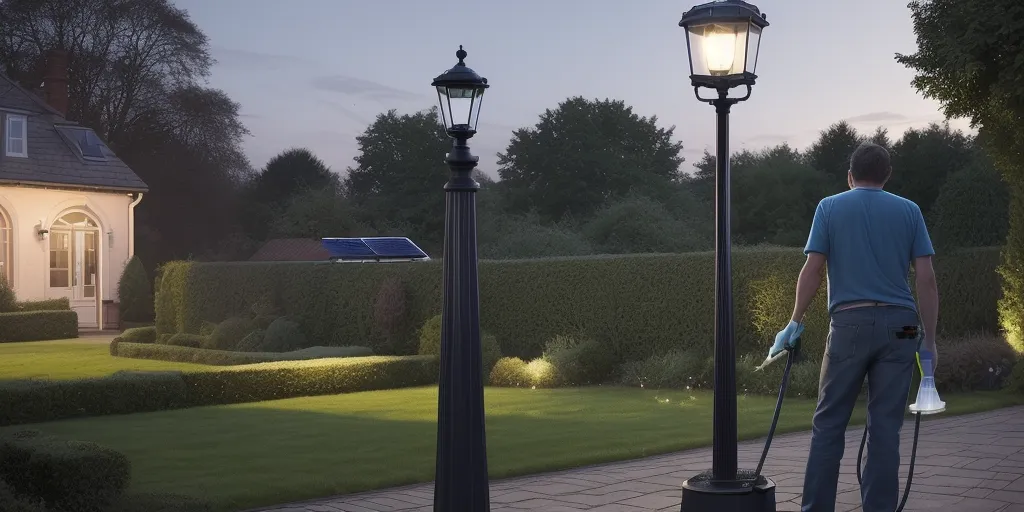How Do I Maintain and Clean Solar Lights

Solar lights are a fantastic way to illuminate outdoor spaces while being environmentally friendly and cost-effective. However, like any outdoor fixture, solar lights require regular maintenance and cleaning to ensure they operate efficiently and last for years. In this guide, we'll cover the essential steps for maintaining and cleaning your solar lights, ensuring they stay in top condition.
Cleaning the Solar Panels
The solar panel is the most critical component of your solar light, as it collects sunlight and converts it into energy to power the light. Over time, dirt, dust, and debris can accumulate on the panel's surface, reducing its ability to absorb sunlight effectively. Cleaning the solar panel regularly is essential to maintain the light's efficiency.
To clean the solar panel, use a soft cloth or sponge dampened with water. Gently wipe the surface of the panel to remove any dirt or grime. For more stubborn dirt, you can use a mild soap solution, but avoid using abrasive cleaners or scrubbing pads that could scratch the panel. It's a good idea to clean the panels every few weeks, especially if you live in a dusty or pollen-heavy area.
Checking and Replacing Batteries
Solar lights are powered by rechargeable batteries that store the energy collected by the solar panel during the day. Over time, these batteries can lose their ability to hold a charge, which can result in dim or inconsistent lighting. Regularly checking the batteries is an important part of solar light maintenance.
Most solar lights use either Ni-Cd, Ni-MH, or lithium-ion batteries, which typically last between 1 to 3 years. To check the batteries, open the battery compartment (usually located on the underside of the solar panel or light housing) and inspect the batteries for signs of corrosion or leakage. If the batteries appear damaged or if the light's performance has declined, it's time to replace them.
When replacing batteries, be sure to use the same type and capacity as the original batteries to ensure proper operation. After replacing the batteries, allow the lights to charge fully before testing them at night.
Inspecting and Cleaning the Light Fixtures
The light fixtures themselves can also accumulate dirt, insects, and other debris, which can reduce the quality of the light output. Regularly inspecting and cleaning the fixtures will help maintain their appearance and performance.
Use a soft brush or cloth to remove any dirt or debris from the light housing and lens. If the lens is particularly dirty or cloudy, you can use a mild soap solution to clean it. Be sure to dry the fixtures thoroughly after cleaning to prevent water spots or damage. Additionally, check for any signs of wear or damage, such as cracks in the housing or loose components, and repair or replace them as needed.
Maintaining Solar Lights During Winter
Winter weather can be tough on solar lights, especially in regions with heavy snowfall or freezing temperatures. To maintain your solar lights during winter, it's important to take a few extra precautions. First, ensure that the solar panels are clear of snow and ice, as this can block sunlight and prevent the batteries from charging. You may need to clear the panels after each snowfall to keep them operating efficiently.
If your area experiences extended periods of freezing temperatures, consider storing your solar lights indoors during the harshest months to protect the batteries and components from damage. Alternatively, you can invest in solar lights with cold-weather batteries that are designed to operate in lower temperatures.
Maintaining Commercial-Grade Solar Lights
Commercial-grade solar lights are built to withstand more demanding conditions and typically require less frequent maintenance. However, due to their larger size and more powerful components, they may require specialized care to ensure long-term performance.
For commercial-grade solar lights, it's important to regularly inspect the solar panels and fixtures for any signs of wear or damage. These lights often have larger solar panels that can accumulate more debris, so cleaning them thoroughly is essential. In areas with heavy traffic or exposure to harsh weather, such as coastal regions or industrial sites, you may need to clean and maintain the lights more frequently.
Additionally, commercial-grade solar lights often come with larger battery packs, which should be checked and replaced according to the manufacturer's recommendations. These batteries are typically more robust but can still degrade over time, especially in extreme conditions. Regular maintenance will help ensure that your commercial-grade solar lights provide reliable, high-quality illumination for years to come.
Final Tips for Solar Light Maintenance
To keep your solar lights in the best possible condition, follow these final maintenance tips:
- Keep the area around the solar lights free of tall grass, shrubs, or other obstructions that could block sunlight.
- Periodically check the light's settings, such as motion sensors or timers, to ensure they are functioning correctly.
- If your solar lights are in a location prone to vandalism or theft, consider securing them with brackets or locks.
- Inspect the wiring and connections for any signs of wear or corrosion, especially in wet or humid environments.
By following these maintenance and cleaning tips, you can extend the life of your solar lights and ensure they continue to provide bright, reliable illumination for your outdoor spaces.